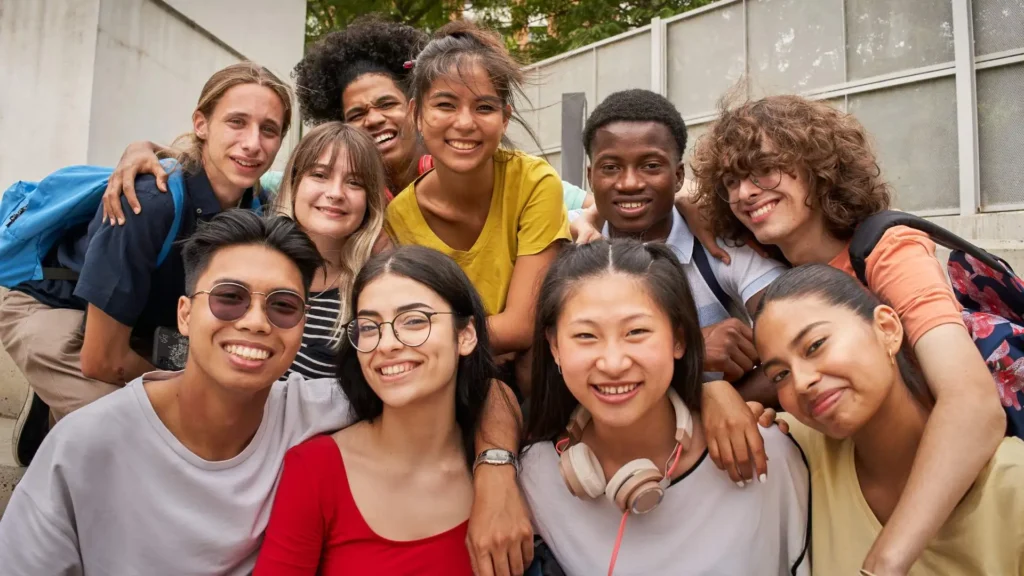Think of this: You are in your dorm with a cup of coffee and looking at your laptop. A friend mentions a remote group project with a tech startup that pays well. Before you search for it, the opportunity vanishes. That missed chance hurts, particularly when you’re building your resume and need some extra money.
Remote group projects are perfect for students. But finding these jobs is tough—like looking for a lost needle in a big stack of hay. That’s where JobsGPT in the Blitz app steps in. This AI-powered job helper makes it easy to find group projects that fit your likes, skills, and time.
JobsGPT saves you hours and links you with real opportunities that suit student life. Let’s dive into all about leveraging JobsGPT to discover remote group projects.
Why Remote Group Projects Are a Game-Changer for Students
If you’re in college, you know real-world experience matters a lot when you apply for jobs or internships. Remote group gigs are changing how students get work experience and get ready for careers. Here’s why they are key:
Hands-On Learning
You learn by tackling real problems, not just reading about them. Remote projects let you use what you know from class on actual tasks.
Global Collaboration
You get to work with students from other places, even other countries. This helps you get better at working with others and sharing ideas.
Confidence Booster
These gigs give quiet folks a place to talk and share ideas without the stress of full rooms or normal group setups.
Future Opportunities
Doing well in projects can help you network with others, which might lead to internships, good words, or job offers.
Portfolio Growth
Projects you complete remotely can be added to your portfolio. These become strong examples to show future employers what you can do beyond traditional coursework. Discover about JobsGPT Job Analytics: Understanding Demand for Your Major.
The Challenge: Finding Virtual Group Work Isn’t Easy
Students want to join good projects, but finding the right ones can be annoying. Traditional ways don’t often link you to structured, short-term group work that matters. Here are some challenges faced by students:
Limited Bulletin Boards
School boards or campus flyers don’t reach far, leaving many students not knowing about team or group gigs beyond their close network.
Narrow LinkedIn Posts
LinkedIn connections often focus on jobs and internships, not flexible projects. Students searching there usually find few options that match the scale or timeframe they are hoping for.
No Short-Term Listings
Most job sites show long-term roles, not quick, project gigs. This makes it hard for students who want great group work without long commitments.
Read: Exploring Freelance and Gig Work Opportunities with JobsGPT
Unstructured Platforms
Even when group gigs are around, many platforms lack a clear setup. Students end up lost in vague ads without set roles, times, or goals, making things more stressful.
Introducing JobsGPT’s Remote Project Discovery Tool
JobsGPT is an AI-powered guide built for students who want real opportunities. With its Remote Project Discovery Tool, students now have a dedicated way to discover, filter, and join meaningful group projects.
Here’s what makes it powerful:
- An AI-powered search that finds many remote team projects.
- Smart filters allow you to sort by your skills, what you study, the time you can give, the tools you know (like Figma, Python), and the type of project.
- Suggests hackathons, design runs, and student startups, providing chances to work on cool projects beyond class.
- Saves time by making a messy list of gigs into one easy list for fast finding and joining.
Whether you want something for your portfolio or just to work with others, JobsGPT helps you find what’s right.
Types of Remote Group Projects You Can Discover with JobsGPT
There are many kinds of group projects out there. JobsGPT helps you find ones that fit what you’re good at and what you like. Let’s look at what you can find:
University-Sponsored Virtual Challenges
Many schools and companies hold online competitions like coding races, case battles, or design rushes. JobsGPT shows you these so you can join, show off your skills, and maybe win some praise.
- Work on real-world case studies
- Team up with mixed skill groups
- Get praise that helps your resume
Peer-Led Side Hustles or Startups
Students are always building things: apps, nonprofits, brands. JobsGPT helps you find these passion projects so you can contribute your skills while getting early startup experience.
- Help launch an app idea.
- Join a marketing campaign for a student-led brand
- Contribute to an early-stage peer startup
Skill-Building Communities & Learning Cohorts
Some spots, like Coursera or Google Career Certs, have group tasks as part of their learning. JobsGPT surfaces these so you can join learning-focused cohorts while also building teamwork skills.
- Work on structured capstones.
- Gain skills in a guided, low-pressure environment
- Add certified experiences to your portfolio
Freelance Client Work with Team Collaboration
Students often form collectives or small agencies that take on freelance gigs together. JobsGPT highlights these, giving you the chance to join and work on real client projects.
- Get real client-facing experience.
- Collaborate with other students.
- Add freelance work to your resume
How to Use JobsGPT to Join the Right Remote Group Project
Finding the right remote project is not just about luck; it is about knowing where to look and how to join. JobsGPT simplifies this by guiding you from making your profile to teaming up.
Here is how you can get started step by step.
Step 1: Set Up Your Skills, Interests, and Availability
Start by building your profile inside JobsGPT. List your key skills, like coding, writing, designing, or planning. This helps the AI find projects that need what you’re good at.
Next, tell how many hours a week you can work. Whether it’s 5 hours or 20, being clear about your time helps get the right fit.
Step 2: Browse Curated Remote Projects
Once your profile is done, start looking at projects chosen by JobsGPT. These aren’t random—they are picked for people like you.
You can sort projects by team size, length, and aim. This helps you pick one that meets your needs or goals.
Step 3: Apply or Join with One Tap
After finding a project that feels right, you can apply directly with just one tap. JobsGPT makes the process quick, so you don’t waste time filling out endless forms.
Some opportunities also include AI-paired introductions. This means the system finds other students whose skills match yours, making teamwork easier and better.
Step 4: Sync Project to Your JobsGPT Dashboard
Finally, once you join, sync the project to your JobsGPT dashboard. This central space helps you keep track of everything, from deadlines to team members.
You can also use the dashboard to share documents, log what you’ve learned, and even export a project summary. Having these details ready makes it easy to add experience to your portfolio or resume later.
Real-World Scenarios: What Students Are Using This For
To see how it works in practice, here are real student use cases:
Alex, the CS Major from UCLA
Alex joined a 3-week app development sprint with students from Michigan and NYU. Together, they built a campus navigation app. For Alex, it wasn’t just coding—it was teamwork across time zones and making something that worked. He later used this sprint to stand out in his internship interviews.
Mia, the Marketing Student from Ohio State
Mia connected with a peer-led startup looking for help on social media campaigns. She managed their Instagram strategy, grew their following by 40%, and even received a strong LinkedIn recommendation from the founder. That one project gave her real-world credibility early in her career.
Jordan, the Design Student from NYU
Jordan jumped into a Notion-based productivity tool launch. He created clean visuals and branding for the app’s release. Later, he used this as a detailed case study in his portfolio, helping him get a big design internship.
Each student got valuable experience without a traditional internship first.
Benefits of Using JobsGPT for Remote Project Discovery
Looking for remote projects can be exhausting when you have to search through endless platforms and still end up with half-serious teammates. JobsGPT makes everything smoother by helping you find quality projects with the right people. Here are the clear benefits that make it worth using:
Centralized Search
JobsGPT saves you from wasting hours across Reddit, Discord, or Slack by centralizing opportunities in one place. You get a simple, organized hub to discover high-quality remote projects quickly.
Reliable Peers
Work with serious collaborators who are motivated and committed. No more dealing with flaky teammates who disappear when the real work begins.
Quality Filtering
Every project on JobsGPT is pre-filtered for relevance, learning value, and seriousness. You don’t need to sift through random or low-quality posts since the platform ensures meaningful opportunities only. Here’s How to Use JobsGPT for Skill-Based Job Recommendations.
Career Leverage
Your completed projects don’t just sit unnoticed. JobsGPT makes it easy to turn them into resume points, LinkedIn highlights, or case studies that boost your career profile for internships.
Easy Tracking
Forget messy group chats and lost files. JobsGPT gives you one dashboard where you can manage deadlines, files, and updates smoothly, keeping projects on track without stress or confusion.
Combine with ResumeGPT, SkillGPT, and Portfolio Tools
JobsGPT works seamlessly with other AI-powered tools to maximize your outcomes.
- ResumeGPT helps you frame your project contributions in strong, recruiter-friendly language.
- SkillGPT recommends tutorials for the tools you will be using in your project.
- Portfolio tools in JobsGPT let you export your project experience into LinkedIn posts, case studies, or professional portfolio summaries.
Together, these features ensure that every remote project becomes a stepping stone to stronger job prospects.
FAQs About Leveraging JobsGPT to Discover Remote Group Projects
Are these projects graded or informal?
It varies. Some are part of courses and are graded, while others are for building skills, portfolios, and experience. JobsGPT shows both choices so you can pick what suits your goals.
Can I find paid group projects, too?
Yes, you can. Many businesses and startups put up remote projects with pay or stipends. JobsGPT filters these opportunities so you don’t miss out on projects that let you earn while you learn.
Do I need to already have a team to join?
No, you don’t. JobsGPT can connect you with open projects where students are looking for new members. You can jump in solo and still find the right fit.
Can JobsGPT pair me with students who complement my skill set?
Absolutely. JobsGPT’s AI matches you with students whose skills complement yours. This creates a balanced team, raising your chances of project success.
Will these projects help me get internships or jobs later?
Yes, they might! Remote group work counts as real job experience. When you put these on your resume or LinkedIn, you show off teamwork, fixing issues, and hands-on skills that bosses look for.
Final Thoughts: Remote Projects That Actually Build Your Career
Not all career-building experiences come from official internships. Remote group projects are a great way to pick up skills, meet peers, and prove to bosses that you work well with others.
JobsGPT makes finding these opportunities simple. It looks for, sorts, and matches you with group work fitting your time, skills, and aims. No wasted time and no missed opportunities.
Download the Blitz app and start using JobsGPT today and be the student who catches every chance for the perfect online job that could build their tomorrow.





